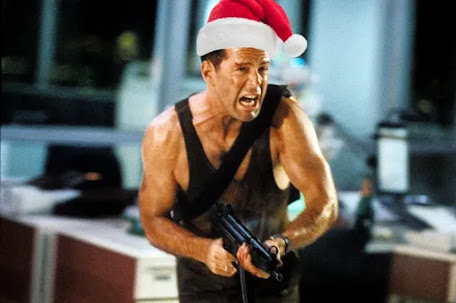This week and next week on Craft Service, Christmas movies!
We start today with modern classic LOVE ACTUALLY, Richard Curtis' 2003 film about a bunch of interrelated love stories happening the month before Christmas in the United Kingdom.
Some people love this film. Some people do not. Personally I am mostly in the "love this film" side, although I will say in thinking about it one major flaw I find with the film is that almost all of its stories are either told almost exclusively from the point of view of the men in them or have the male characters in them driving the story.
Also, with the maybe exception of Billy Mack and his manager Joe, this is a film about love stories that has no queer people in it. In fact the film has the audacity to offer a seemingly queer character in Andrew Lincoln's Mark only to then add the "twist" that actually he's straight too.
Personally I do tend to see Billy and Joe as a queer story, but even if that was the author's intention--which it seems pretty clear it wasn't--in a story with a dozen different love stories, you should be able to do better than one iffy queer story.
But the film's failure also points to its strength, which is its willingness to brainstorm interesting possibilities off of a premise. I've talked about just how much you can get from the simple act of brainstorming before.
So here let me highlight the key to the success of the brainstorming here: A clear and specific premise.
This is not just a set of fun/complicated love stories; it's a set of stories that all have as their premise Love is forced to overcome fear. At the one extreme is Sam, who is going to do whatever it takes to share his love for Joanna, including learning how to play the drum set in three days and chasing her through airport security and getting arrested; and also Colin Frissell, who just KNOWS that if he goes to Milwaukee, Wisconsin he is going to find love.
At the other extreme is Mark, who is a real creeper when it comes to Keira Knightley's Juliet, absolutely incapable of either overcoming his fear or dealing with it until he gets caught--at which point he finally says what he's wanted to say all along and is free of it; Alan Rickman's Harry, who doesn't seem afraid on the surface but clearly is, of continuing to live just an ordinary life (and how dare he, Emma Thompson is everything); and Laura Linney's Sarah, who simply cannot get past her own defense mechanisms even when Karl is right there in bed with her.
Sarah's story is the one that seemed to me like it fit the least the first couple times I watched LOVE, but now it's really the story that unlocks everything. Even as she has this other thing that really gets in the way, her brother, it's made so clear that he represents a defense mechanism, something that is not a life-giving choice for her, but rather that she uses to protect herself.
A screenwriting piece of advice that has always haunted me: If your third act doesn't work, it's because you fucked up something in act one. When you're doing the kind of brainstorming LOVE ACTUALLY does, I think there's a similar rule. If you keep the subject of a brainstorm too general, the pieces are likely to fit together only in a general way. To get the best result you need to polish away at that idea until you know exactly what you're asking for.
Really brainstorming is like requesting a wish from a genie: Be specific or be damned.
An Exercise to Try: Think of something you might need to brainstorm about for a story you're working on. But instead of actually doing the brainstorm, try to hone the actual subject down. See just how specific you can get.








